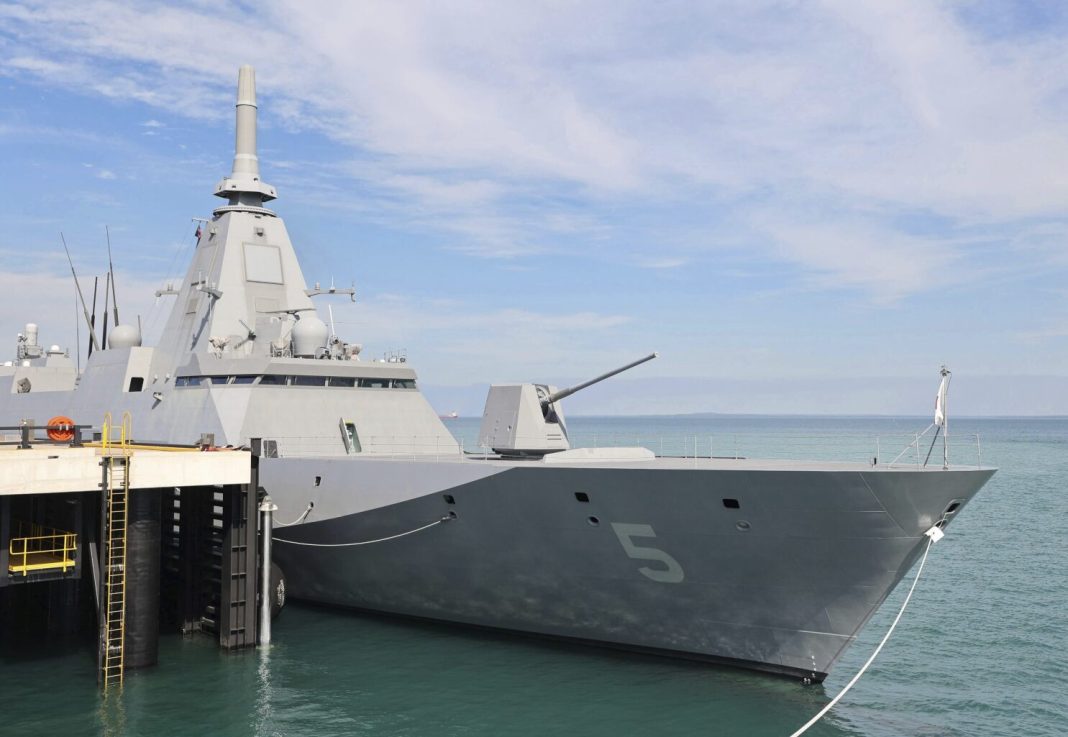Australia has taken a big step toward strengthening its naval power. On August 5, the Australian government confirmed that it would adopt an upgraded version of the Japanese Frigate Mogami-class as the platform for 11 new warships. These ships are planned for the Royal Australian Navy and will form part of its future fleet.
Australia Chooses Japanese Frigate Design
The Mogami-class ranks among Japan’s most modern naval vessels. Japan designed this Japanese frigate with advanced technology to ensure efficiency and strong performance at sea. Unlike older and larger destroyers that require very large crews, the upgraded Mogami operates with about 90 sailors. This number is almost half of what ships of similar strength usually require. A smaller crew cuts down operating costs and makes the ship easier to manage.
Another major advantage of this Japanese frigate lies in its weapons system. Engineers equipped the Mogami with missile systems compatible with U.S. military equipment. This compatibility allows the vessel to coordinate with allied navies, especially the United States. For Australia, which regularly conducts joint training and missions with the U.S., this feature provides a very important benefit.
Currently, Australia and Japan are still discussing the cost of these ships. Both sides are negotiating prices and technical details. The two governments expect to sign a formal contract next year. Until then, officials will continue inspections and talks to make sure Australia receives the exact specifications it needs for its navy.
Defense Chief’s Planned Japanese Frigate Inspection
To move the process forward, Australian Defense Minister Richard Marles will travel to Japan early next month. Marles is not only the country’s defense chief but also serves as Australia’s Deputy Prime Minister, showing how significant this project is for Canberra.
According to sources, Marles will personally tour a Japanese frigate Mogami-class at the Japanese Maritime Self-Defense Force base in Yokosuka, located in Kanagawa Prefecture, south of Tokyo. This base is one of Japan’s most important naval facilities. By stepping aboard the frigate, Marles aims to see the vessel’s features firsthand and understand how it performs in real-world conditions.
Australia Asserts Global Power With Critical Minerals Reserve
The inspection will allow him to review the Japanese frigate’s technology, weapons systems, and crew operations. It will also help Australia evaluate whether the frigate meets its exact requirements for the future Royal Australian Navy fleet. Such a visit demonstrates the seriousness of the project and the trust Australia is placing in Japanese shipbuilding expertise.
The Japanese frigate Mogami-class has already earned a reputation for being highly capable in different missions, from surveillance to combat support. For Australia, which operates across vast ocean areas, having a reliable and versatile warship is critical. Marles’ tour is therefore seen as an important step in the decision-making process.
Key Diplomatic Meetings in Tokyo
Richard Marles’ trip will not be limited to inspecting the Japanese frigate. He will also attend a “two-plus-two” meeting in Tokyo, where the foreign ministers and defense ministers of Japan and Australia meet together. This format allows both countries to address defense and diplomatic matters at the same time.
The meeting is held once every year, with Japan and Australia taking turns to host. It serves as a platform to review defense cooperation, discuss regional security challenges, and share updates on projects such as the frigate deal. By attending this meeting, Marles will also have the chance to exchange views with his Japanese counterparts on broader security issues in the region.
Japan Battles Germany for $6.5B Australian Warship Deal
Over the years, Japan and Australia have steadily built up a strong defense partnership. Both nations see maritime security and regional stability as shared priorities. Their collaboration ranges from joint naval exercises to agreements on technology and defense trade. The decision by Australia to adopt the Japanese frigate Mogami-class reflects this close cooperation and highlights the trust between the two sides.
Marles’ visit to Japan will therefore serve two main purposes: first, to inspect the Japanese frigate Mogami-class and review its performance; second, to take part in high-level discussions with Japanese officials through the annual two-plus-two meeting. Together, these events underline the growing importance of defense collaboration between Japan and Australia at a time when both countries are seeking to modernize their military capabilities.
